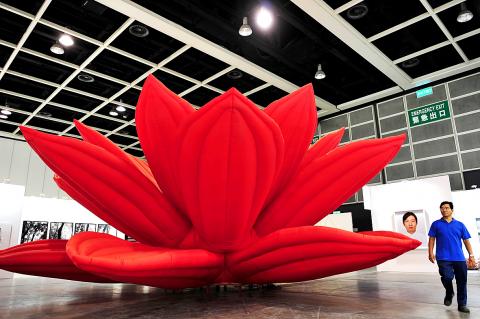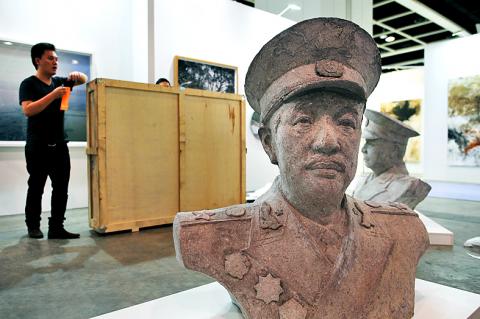A boom in private museums funded by wealthy collectors is transforming the artistic landscape in Asia and filling the cultural vacuum left by penny-pinching governments, experts say.
Organizers of the Hong Kong International Art Fair (Art HK), which opened in the southern Chinese territory on Thursday, said the next Henry Tate or John D. Rockefeller Jr could be among the collectors perusing the pieces for sale.
Art HK advisory board member Philip Dodd, the former director of the Institute of Contemporary Arts London, said the growth of private museums was symbolic of the shift in economic power from West to East.

Photo: AFP
“For a short period these private museums are functioning as national museums, like the Met,” he said, referring to the Metropolitan Museum of Art in New York, which grew from the private collection of a railroad boss.
“As the power is moving East, there is a sense that China is moving from ‘Made in China’ to ‘Created in China.’”
Indonesian tobacco baron Oei Hong Djien, whose recently opened OHD Museum in the city of Magelang is intended as a de facto national gallery, was among the visitors to the Hong Kong fair.

Photo: AFP
“We do not have a national museum and the government is not taking steps in that direction, so we as private collectors have to take over that role,” he told a panel discussion, referring to his homeland of 240 million people. “In Indonesia, most or all of the private museums are funded by the main business of the owner, which is not related at all to art.”
The OHD Museum, which opened last month in central Java, is a trove of about 1,500 modern and contemporary pieces of Indonesian art, collected by 74-year-old Djin over five decades.
“My collection is like a national museum. It is very much historically orientated and that is because we don’t have a national museum from the government,” he said.

Photo: AFP
New York-based Art+Auction magazine recently placed another Indonesian private gallery owner, Budi Tek, eighth on a list of the 10 most influential collectors in the world.
Li Bing (李兵), who owns the Beijing He Jing Yuan Art Museum in the Chinese capital, said economic and social reforms since the late 1970s had unleashed a natural instinct for private collecting in China.
“In the past 30 years of reform the Chinese have gone back to this habit of collecting art and things of value, and this has a lot to do with our historic economic development,” he said. “The love for art and culture is something we all share. I would like to share my own passion and commitment with everyone.”
Wang Wei (王薇), who is rushing to open her private Dragon Art Museum in Shanghai in November, during the auspicious Year of the Dragon, said she began as a “housewife” with a plan to collect Chinese political art.
“I was thinking that I could collect in a systematic manner to reflect the history of that art,” she said. “I would like to develop a family-based, community-based and also female-dominated gallery.”
Lars Nittve, the former director of the Tate Modern Gallery in London, is now leading a state-backed project to develop a museum of contemporary art on the waterfront in Hong Kong, which will be known as M+.
He said there had been “exponential growth” in private museums in Asia, with hundreds of new spaces for art opening around the region in recent years. Hong Kong is third only to New York and London as an art auction center.
“If you go back 100 years or so [in the US] there was a sudden boom in culture, cultural facilities and museums and concert halls and so forth, and it happened at a certain stage in the economic development,” he said. “There are different drivers behind this, but of course it all needs finance to become a reality.”
Some of the Art HK merchandise bears the provocative slogan “Money Creates Taste,” a message private museum owners could be tempted to embrace.
However, Nittve said he disagreed that wealth created taste in the contemporary Asian art scene, despite the power of rich private benefactors.
“Many of the taste-creators are not the wealthiest,” he said. “The wealthiest are making use of the existing taste and want to be seen as having that taste, but they might not be the ones who created that taste.”

Meta Platforms Inc offered US$100 million bonuses to OpenAI employees in an unsuccessful bid to poach the ChatGPT maker’s talent and strengthen its own generative artificial intelligence (AI) teams, OpenAI CEO Sam Altman has said. Facebook’s parent company — a competitor of OpenAI — also offered “giant” annual salaries exceeding US$100 million to OpenAI staffers, Altman said in an interview on the Uncapped with Jack Altman podcast released on Tuesday. “It is crazy,” Sam Altman told his brother Jack in the interview. “I’m really happy that at least so far none of our best people have decided to take them

BYPASSING CHINA TARIFFS: In the first five months of this year, Foxconn sent US$4.4bn of iPhones to the US from India, compared with US$3.7bn in the whole of last year Nearly all the iPhones exported by Foxconn Technology Group (富士康科技集團) from India went to the US between March and last month, customs data showed, far above last year’s average of 50 percent and a clear sign of Apple Inc’s efforts to bypass high US tariffs imposed on China. The numbers, being reported by Reuters for the first time, show that Apple has realigned its India exports to almost exclusively serve the US market, when previously the devices were more widely distributed to nations including the Netherlands and the Czech Republic. During March to last month, Foxconn, known as Hon Hai Precision Industry

PLANS: MSI is also planning to upgrade its service center in the Netherlands Micro-Star International Co (MSI, 微星) yesterday said it plans to set up a server assembly line at its Poland service center this year at the earliest. The computer and peripherals manufacturer expects that the new server assembly line would shorten transportation times in shipments to European countries, a company spokesperson told the Taipei Times by telephone. MSI manufactures motherboards, graphics cards, notebook computers, servers, optical storage devices and communication devices. The company operates plants in Taiwan and China, and runs a global network of service centers. The company is also considering upgrading its service center in the Netherlands into a

Taiwan’s property market is entering a freeze, with mortgage activity across the nation’s six largest cities plummeting in the first quarter, H&B Realty Co (住商不動產) said yesterday, citing mounting pressure on housing demand amid tighter lending rules and regulatory curbs. Mortgage applications in Taipei, New Taipei City, Taoyuan, Taichung, Tainan and Kaohsiung totaled 28,078 from January to March, a sharp 36.3 percent decline from 44,082 in the same period last year, the nation’s largest real-estate brokerage by franchise said, citing data from the Joint Credit Information Center (JCIC, 聯徵中心). “The simultaneous decline across all six cities reflects just how drastically the market